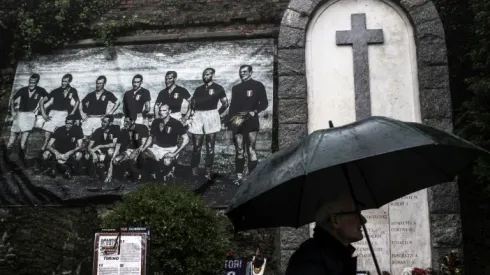Turin (Italy) (AFP) – Every year thousands gather at the Basilica of Superga overlooking Turin to commemorate the memory of Italian football’s all-conquering ‘Grande Torino’ team who were wiped out in an air disaster.
This year, Englishman Bill Lievesley will be among them to mark the 70th anniversary of the tragedy which claimed the lives of 31 people including his father Leslie Lievesley, the team coach, among 18 players and officials.
The team known as the Invincibles, winners of five Serie A titles in a row, formed the backbone of the Italian national team at the time.
They were returning from a match against Benfica in Lisbon, when their plane crashed in foggy and cloudy conditions into the Superga hill overlooking Turin.
“Outside of Italy most people have never heard about the Torino disaster – the only football disaster they know about is the Manchester United one,” Lievesley told AFP before travelling to northern Italy from his home in England.
“It’s as if people now seem to have found out about it,” he said.
“I certainly didn’t forget about it because it completely changed my life around.”
Bill was just ten when his 37-year-old father, a former Manchester United and Crystal Palace defender, was killed.
Incredibly Leslie had previously survived three air crashes, two with the Royal Air Force during the Second World War, and a third with the Torino youth team, at Turin airport.
Lievesley arrived in Torino in 1947, coaching alongside Holocaust survivor Erno Egri Erbstein from Hungary, having first trained Dutch side Heracles Almelo after the war.
Bill recalls returning home on May 4, 1949 and his mother Nellie telling him “people are saying that there has been a plane crash”.
“Nobody believed it had happened until several hours later,” recalls Bill, an 80-year-old retired engineer with the National Health Service.
“It was a terrible day with low cloud and poor visibility, the plane went into the hill. It was like I was moving about in a bit of a dream for a while.”
On Saturday, he will attend the commemoration ceremony along with his partner Wendy and daughters Joanne and Susan, as he did ten years ago.
Mirella Loik and Franco Ossola, whose fathers, midfielder Ezio Loik, and forward Franco Ossola, also died, will also be present.
Before that Bill had never returned, moving back to England because his mother wanted his father to be buried in the same churchyard as his family in Washington, five miles (eight kilometres) from Doncaster.
Bill says moving back had been a “culture shock” after their comfortable lifestyle in Turin, living initially in a colliery house in the coal-mining north with his grandmother.
“I would have preferred to stay in Italy but my mother did what she thought best.”
His memories are of his father bringing him to the team’s former Filadelfia Stadium to play with the other kids before realising “I couldn’t kick a ball”.
“I remember walking around Turin, the big park with the statues, the bridge over the Po and of course the view of Superga which overlooks the city.”
– ‘Stark reminder’ –
Bill now returns regularly to Turin, and has since forged friendships, donating his father’s coaching manual to the museum dedicated to the tragedy, the Museo del Grande Torino e della Leggenda Granata, run by a dedicated group of volunteers who keep the memory of the club alive.
The museum was housed in the Superga Basilica for a few years before moving in 2008 to Villa Claretta, a former 17th century royal hunting lodge at Grugliasco, nine kilometres west of Turin.
Thousands of documents, memorabilia, team photos, the wooden locker room and VIP seats from the Filadelpia Stadium, are on display having been recovered after being thrown into a skip following the stadium’s demolition.
Also on display is wreckage from the crash.
“The propeller stands out for me and also the wheel, a stark reminder,” said Bill.
Suitcases owned by Egri Erbstein, defender Virgilio Maroso, and midfielder Valentino Mazzola, who all died, are also displayed.
The museum also traces the history of the team back to its foundation in 1906 — almost ten years after city rivals Juventus.
A shiny black vintage Fiat Balilla car owned by club icon Gigi Meroni, a Torino and Italy star of the 1960s, who was killed when struck by a car aged 23 in 1967, takes pride of place in the front hall.
Bill also returned for the inauguration of the new Filadelfia Stadium in May 2017, and was presented with a Torino jersey with his name on the back.
The museum finally hopes to be able to move there and open to the public full time.
“It’s impossible to think that a football club with the history of Torino doesn’t have a museum supported by the club,” Museo del Grande Torino president Domenico Beccaria told AFP.
“We’re near finding an agreement, but it’s still not done yet.”
Torino as a team have never fully recovered from the disaster.
They have won the league just once since, claiming a seventh Serie A title in 1976, while city rivals Juventus have dominated Italian football, winning their eighth consecutive and 35th Scudetto overall this season.














